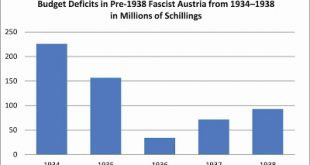The Austrian theory of money virtually begins and ends with Ludwig von Mises's monumental Theory of Money and Credit, published in 1912.1 Mises's fundamental accomplishment was to take the theory of marginal utility, built up by Austrian economists and other marginalists as the explanation for consumer demand and market price, and apply it to the demand for and the value, or the price, of money. No longer did the theory of money need to be separated from the general economic theory of...
Read More »Austerity in Pre-1938 Fascist Austria
From 1933 to 11 March 1938, Austria was ruled by the clerical fascist Fatherland Front in a regime called the Austrian Federal State.The two dictators of Austria in this period were as follows:Dictators of the Austrian Federal State 5 March 1933–25 July 1934 – Engelbert Dollfuss 29 July 1934–11 March 1938 – Kurt SchuschniggAlthough the Fatherland Front had some anti-capitalist elements, the fact is that in power Engelbert Dollfuss and Kurt Schuschnigg pursued spending cuts, austerity, budget...
Read More »Jason Smith — Money is the aether of macroeconomics
So I've never really understood Modern Monetary Theory (MMT). In some sense, I can understand it as a counter to the damaging "household budget" and "hard money" views of government finances. To me, it still cedes the equally damaging "money is all-important" message of monetarism and so-called Austrian school that manifests even today when a "very serious person" tells you it's really the Fed, not Congress or the President that controls the path of the economy and inflation when neither...
Read More »Mish — Bitcoin vs Dollars: Which One is a Fraud? Which One is a Ponzi Scheme?
MMT Foolishness: Modern Monetary Theory (MMT) suggests that debt does not matter and governments can print at will creating a virtual utopia of constant growth. MMT, Keynesian, and Monetarism all suffer from the same fatal flaw: They promise something for nothing, in various ways. For discussion, please see Debunking MMT, Keynesianism, Monetarism: Reader asks “What theories do you believe?” Mish Reading List. Those who believe in the absurdity that a benevolent government would spend the...
Read More »Joseph Salerno — A Program to Stabilize the Economy—in Four Words
Paul Cantor, Clifton Waller Barrett Professor of English at the University of Virginia and Associated Scholar of the Mises Institute, attended Ludwig von Mises’s seminar at NYU as a young man. He recently surprised and delighted a few of us by revealing that the line that he remembers Mises speaking most frequently in the seminar was “No farzer credit expansion!” As a native German speaker with an accent and less than complete familiarity with English usage, what Mises meant to say, of...
Read More »Steve Keen on Austrian Economics
Steve Keen gives an interesting lecture below on the Austrian school of economics.[embedded content]Some critical points: (1) it is an oversimplification to say that Austrians do not support equilibrium as the essential feature of a capitalist economy (see 2.20 onwards), though admittedly there is some balance in this point later on. In fact, it is really only the stream of Austrian economics connected with Ludwig Lachmann that questions whether a tendency to general equilibrium is a feature...
Read More »The Filthy Anti-Capitalist Mentality – of Austrian Economics
And I mean the anti-capitalist mentality of the Austrian libertarian cult and certainly in its Rothbardian form, because – make no mistake – these people are anti-capitalist in their core ideological beliefs, no matter how much we have to hear of their blustering nonsense.Let us take the crucial points which make Austrian libertarianism anti-capitalist: (1) Opposition to fractional reserve banking Rothbardians and many other Austrian libertarians oppose even private capitalist fractional...
Read More »Walter Block’s An Austrian Critique of Mainstream Economics: A Critique on Epistemology
This is a talk by Walter Block on Austrian economics and its disagreements with neoclassical economics, given at the Mises Institute in Auburn, Alabama, the US, on 21 July, 2015.[embedded content]I want to focus on epistemological issues here.Let us review the epistemological problems here one by one: (1) the Austrians badly misunderstand the philosophy and epistemology of the logical positivists.For Austrians like Block the expression “logical positivism” is simply an ignorant term of abuse...
Read More »Robert Murphy defends the ABCT – even though he doesn’t accept the Wicksellian Natural Rate of Interest
When Austrians (metaphorically) shoot themselves in the foot, the results are usually amusing.We are treated to just such a delightful spectacle here: Robert P. Murphy, “Mises and the Market,” Dailycaller.com, 26th August, 2015. http://dailycaller.com/2015/08/26/mises-and-the-market/ This is Robert Murphy’s defence of the Austrian business cycle theory (ABCT) as an explanation of recent global turmoil on stock markets and other economic problems.The astute reader will notice that in the...
Read More » Heterodox
Heterodox

